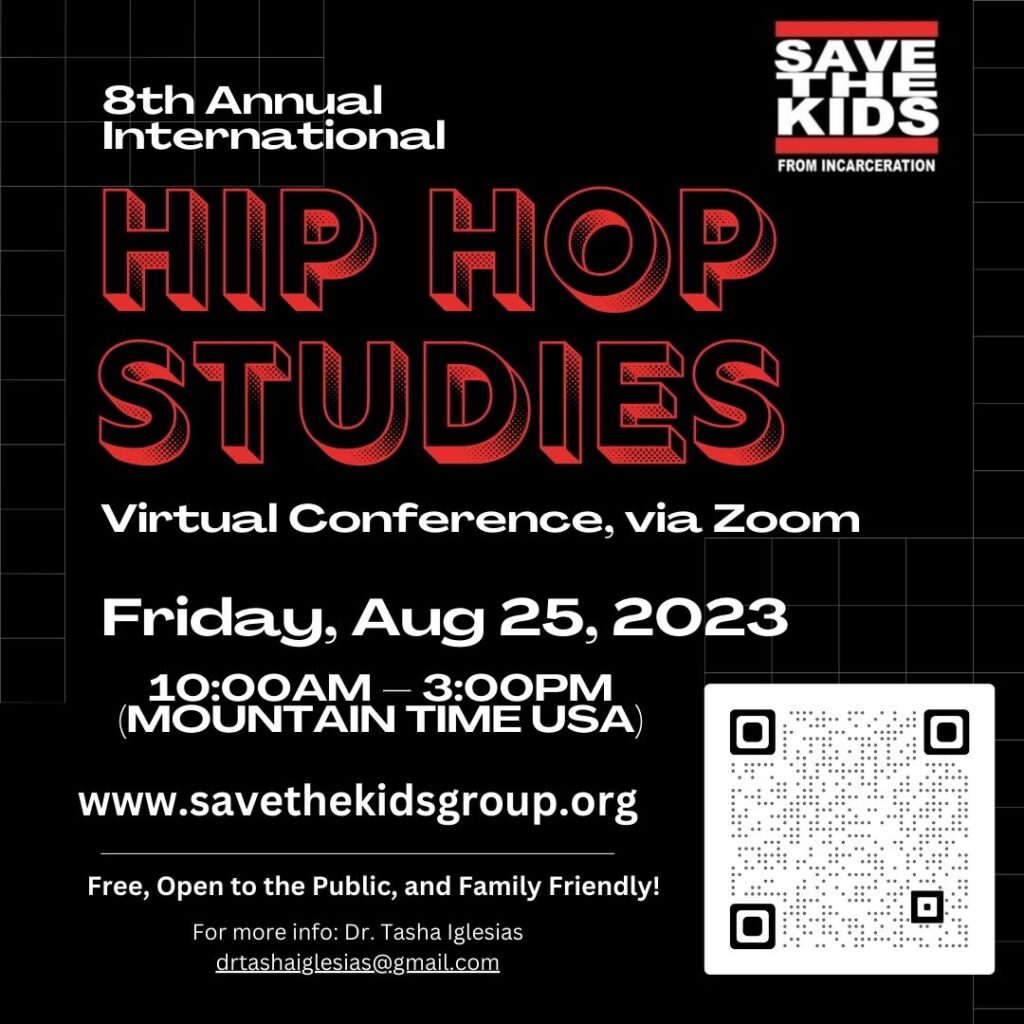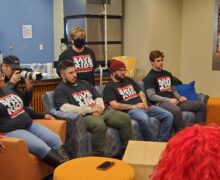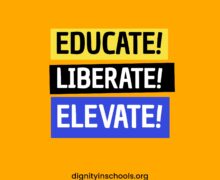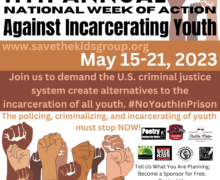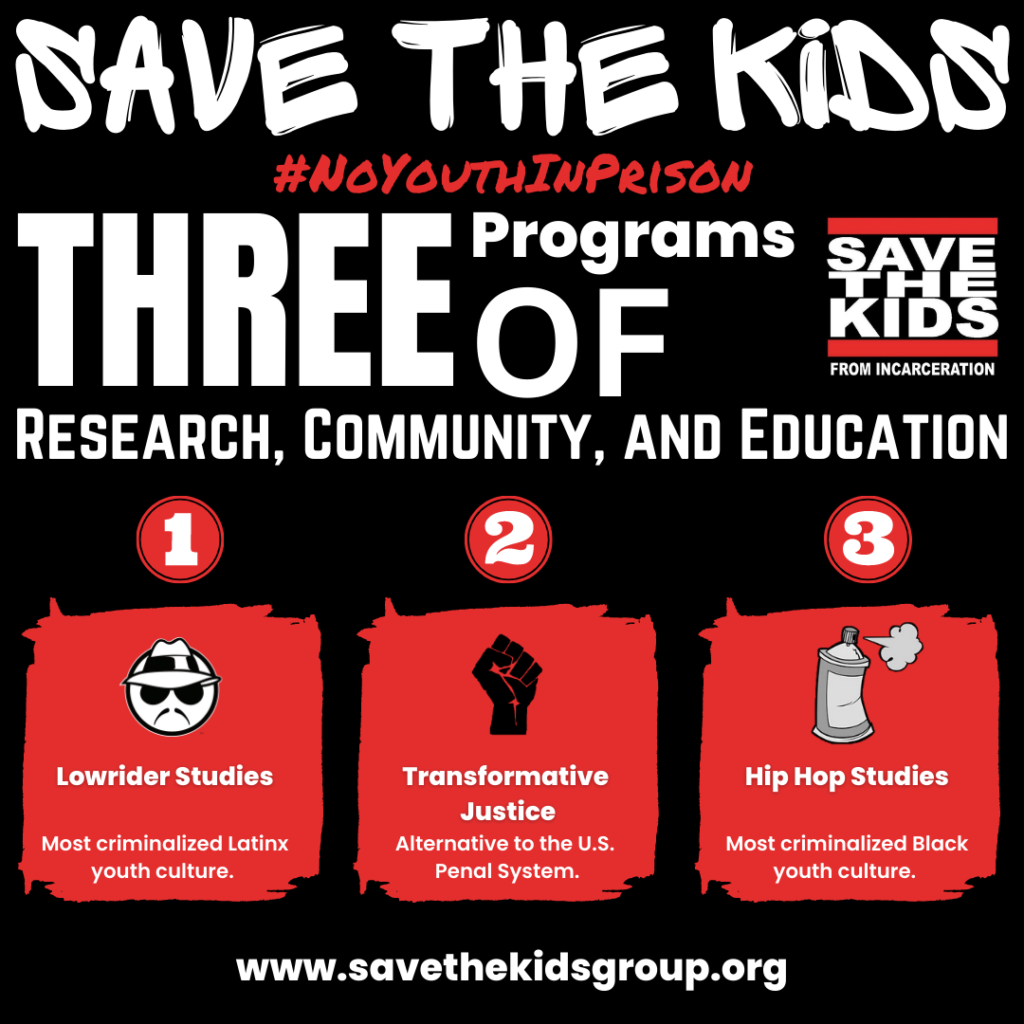8th Annual International Hip Hop Studies Conference – Friday August 25, 2023 – Zoom
8th Annual International Hip Hop Studies Conference
Friday August 25, 2023
Public, Free, Recorded, Family Friendly, and via Zoom
Celebrating 50th Anniversary of Hip Hop and Black August
Register Here:
https://slcc-edu.zoom.us/webinar/register/WN_6O7kc0i6Q-WA6Zn1_2ID0A
Conferences Chairs:
Tasha Iglesias, Gina Alfred, and Tony Quintana
SCHEDULE
(Based on USA Mountain Time)
10:00am – 3:00pm
All Speakers have 20 minutes to present with 10 minutes of Q and A
Sponsored By
Department of Criminal Justice at Salt Lake Community College, Save the Kids, Poetry Behind the Walls, Hip Hop Studies and Activism Book Series, Academy for Peace Education, Wisdom Behind the Walls, Lowrider Studies Journal, Peace Studies Journal, SLCC Vegan Collective, International Hip Hop Studies Association, and Transformative Justice Journal
10:00am-10:10am – Welcoming and Introduction
Gina Alfred, Manager/Student Affairs, Salt Lake Community College
Dr. Tasha Iglesias, Adjunct, Department of Criminal Justice, Salt Lake Community College
10:10-10:30am – Conscious Rap Music: Movement Music Revisited A Qualitative Study of Conscious Rappers and Activism
IFe JIe
Biography: IFe JIe is a South Central Los Angeles native and brings an African sensibility, pride and aesthetic to her art and work as a Hip Hop artist, activist and scholar. IFe JIe is currently the co-host of the show Cut to the Chase on 90.7fm KPFK in Los Angeles. She is also the author of Movement Music Revisited in the book” For the Culture: Hip Hop and the Fight for Social Justice “. Dr. IFe JIe is teaching African American Studies at Los Angeles Trade and Technical College. IFe JIe is striving to continue the legacy of street culture, Hip Hop, activism and scholarship.
Abstract: The purpose of this study is to explore how conscious rap is used as a form of activism. Ethnographies of conscious rappers based in the Atlanta, GA area will be used to understand this relationship. In order to complete this investigation, ten unsigned conscious rappers will be given a series of questions to explore their involvement as activists; some of these artists were also recruited due their affiliations with political organizations also based in Atlanta, GA. By gathering interviews from conscious rappers who consider their music as a form of activism, scholars of African American Studies may further understand the role of music and political activism when mobilizing the African American and minority communities.
10:30-10:40am Q and A
10:40-11:00am – Meeting The Youth Where They Are At: By Zulu King Reies
Reies Romero
Biography: Reies Romero, AKA Zulu King Reies is a Hip Hop Educator, Learner, DJ and Visionary. Reies started out as B-boy in the early 80’s and Started Djing in 92’, he cherishes all the elements and principles of Hip Hop culture. He holds dear to his heart our youth and their empowerment through education. Reies is the founder of the Mni Sota Hip Hop Museum, and the Minnesota chapter of the J Dilla Foundation. He is a restorative justice circle keeper with the Dispute Resolution Center and is part of the Hip Hop Education Center Marketing and Research teams. Reies teaches in the Freedom School Movement (6 years), and serves as the Zulu King for the Twin Cities Omega Zuluz (Zulu Union). He is currently a high school social worker in SPPS, enjoys traveling, eating out, reading, swimming and organizing community events.
Abstract: Hip Hop education is very sacred, yes we know that as the teachers, but do our youth hold it to the same standards as us? This question ripples through our hearts and minds as Hip Hop Educators, we should have the best intentions about our youth, and we hope what we teach them will not only resonate but empower. Reies will share strategies on in-class teaching when Hip Hop is the subject, inform of tools/skills that have worked for him in a structured environment, and how to utilize time, resources and knowledge of the culture. Reies is asking for a fluid conversation around experiences with regards to teaching Hip Hop, which can come in many forms.
11:00-11:10am – Q and A
11:10-11:30am – Hip-Hop As Social Justice Journalism
Manny Faces
Biography: Manny Faces is an award-winning new media journalist, independent scholar and founder of The Center for Hip-Hop Advocacy a non-profit organization utilizing journalism, original research, and media/public outreach to increase awareness and understanding of hip-hop’s important artistic and cultural contributions. He is the producer and host of News Beat (www.usnewsbeat.com), a groundbreaking, award-winning podcast series that melds hard-hitting social justice journalism and expert interviews with music and original Hip Hop lyrics crafted by independent artists.
Abstract: This presentation explores ways that Hip Hop music, culture, and spirit have traditionally documented social issues, what might be hindering the artform’s potential to continue doing so, and why current and future social justice efforts must include a comprehensive understanding, and inclusion, of Hip Hop as a form of journalism. Highlighting specific examples, the presentation aims to inspire Hip Hop fans and detractors alike to view the nation’s dominant youth culture as a largely untapped, but highly effective resource in the ongoing fight for social justice.
11:30-11:40am – Q and A
11:40-12:00pm – Broken Promises: The Need to Develop a Practice of Listening and Attuning to Feminists in Breaking
Jason “J-Sun” Noer
Biography: Jason “J-Sun” Noer is a member of Battle Catz (MN), Rock Lordz (MN), and West Coast Rockers (CA). He is also the artistic director of MIXTAPE, a nonprofit Hip Hop dance theatre company, serving the Twin Cities Hip Hop Dance scene by breaking down barriers to resources and helping to cultivate an artistic ecosystem. Through MIXTAPE, he established the Twin Cities Breaking Archive, a video collection spanning the 1980s to the present showing the rich history of Breaking in Minnesota. J-Sun is the also the former Disciplinary Head of the Hip Hop Dance track at the University of Minnesota (2017-2023).
Abstract: Breaking prioritizes the value of respect, which is deeply connected to the physical movements of the dance form through skill and creativity. However, despite promoting this value, Breaking faces a threat from within: unaddressed and continued sexual harassment and assault. In response to the misogyny and disregard that women have experienced, Jason “J-Sun” argues that the Breaking community needs to develop a practice of listening and attuning to feminists and what they are saying with their dancing and words. In this presentation, J-Sun uses a mixture of movement analysis, interviews, and historical research to support this viewpoint.
12:00-12:10pm – Q and A
12:10-12:30pm – YONKERS The Lost City Of Hip-Hop
Jerome “RAW ROME” Enders
Biography: Jerome “RAW ROME” Enders, is a native of Yonkers, NY, and author of The Man Who Walked the Dog, and Yonkers The Lost City of Hip-Hop, which documents Yonkers Hip-Hop from 1973 to present. Born in Mulford Gardens housing project in Yonkers, Jerome began writing Hip-Hop in ’86, and evolved into an author and filmmaker. “Yonkers, The Lost City of Hip-Hop” and “The Man Who Walked the Dog” (The DJ Superior/DMX story) are cultural timepieces. Jerome appeared on Styles -P’s album “Gangster and A Gentleman” and was instrumental in the LOX/D-Block’s career. RAW ROME “your favorite rapper’s favorite rapper”.
Abstract: Hip-hop is a musical movement that emerged in the Bronx in the 1970s, but it also grew and developed in Yonkers, a city that has produced some of the most influential artists and pioneers of the genre. In this presentation, I will explore and go through the foundational timeline and how Yonkers contributed to the evolution of hip-hop, from the early DJ battles, parties, practitioners ,Graffiti artists and dancers. Decades before the rise of global stars like DMX, Mary J. Blige, and Jadakiss. I will use pictures, flyers, and documents to illustrate the history and impact of Yonkers’ hip-hop scene, as well as readings from the book with testimonies from practitioners and venue owners who witnessed and participated in the growth of the culture. I will also discuss how Yonkers’ hip-hop legacy is being celebrated and preserved today, as the genre marks its 50th anniversary. My presentation aims to show that Yonkers is not only a lost city of hip-hop, but also a vital and vibrant part of its past, present, and future.
12:30-12:40pm – Q and A
12:40-1:00pm – Growing Circle Keepers, School Based Restorative Justice as THE Paradigm Shift
Martin Urbach
Biography: Drummer / Percussionist Martin (pronounced mar-TEEN) Urbach is a Latine Immigrant, educator, activist and youth organizer. His work in the classroom is based on facilitating brave spaces for young folks to fall in love with music and to promote social justice through music making in their community. He holds a BA in jazz performance from the University of New Orleans, a MA in jazz arts from the Manhattan School of Music, an Advanced Certificate in Music Education from Brooklyn College and is currently a Doctoral candidate in Urban Education at the CUNY Graduate Center. Martin has been nominated for a GRAMMY Music Educators Award in 2020, 2021 and 2024. He has been an educator in New York City since 2006, having taught well over ten thousand children; from pre kindergarten to doctoral students at the intersections of music, activism, restorative/transformative justice and leadership.
Abstract: In this session we will explore ways in which a restorative justice program led by youth can help schools transform into healing places where liberatory education and self/community actualization can thrive. Rooted in Paulo Freire’s assertion that “conflict is the basis for learning” (Freire, 1990) and that restorative justice is about making it right, rather than being right (Winn, 2018), participants will explore praxis around youth development, community organizing as they apply to school-based restorative and transformative justice, circle keeping and abolition.
1:00-1:10pm – Q and A
1:10-1:40 BREAK
1:40-2:00pm – Do Things for the Kids: Lessons Learned from VTDITC’s 7 Years of Community-Engaged Scholarship”
Craig Arthur and Dr. Frederick “Freddy” Paige
Biography: Craig Arthur is an Assistant Professor and Head of Community Engagement for Virginia Tech University Libraries. He’s been paying dues and working on his craft as a DJ since 1997; he’s a proud member of the Table Rok DJ Crew. He co-founded VTDITC: Hip Hop Studies at Virginia Tech shortly after starting work at his alma mater in 2016. As a DJ, he’s shared stages with many artists including Kanye West, Common, Little Brother, Clan Destined, Travis Porter, and Lil Yachty. He is a co-founder of the VTDITC: Hip Hop Studies at Virginia Tech initiative.
Biography: Dr. Frederick “Freddy” Paige serves as an Assistant Professor in Civil and Environmental Engineering, and the Assistant Director of the Virginia Center for Housing Research. The Hip Hop community is where Freddy’s interest in being a scholar originated. He is a co-founder of the VTDITC: Hip Hop Studies at Virginia Tech initiative.
Abstract: VTDITC: Hip Hop Studies at Virginia Tech is a national award-winning transdisciplinary, experiential learning, and critical community engagement-focused program that takes place across Southwest Virginia. VTDITC: Hip Hop Studies at Virginia Tech is deeply rooted in Hip Hop culture and pedagogy. The program is cosponsored by roughly a dozen organizations – both on-campus and beyond. At the time of this proposal, we have designed, developed, and assessed more than eight hundred events over the past seven years. To highlight a few of our longstanding features, we host a monthly seminar series as well as weekly studio hours in a community-designed and constructed recording studio. We also have taught more than three hundred media literacy workshops in the broader community beyond campus. Simply put, our mission is to: remove barriers to entry, recognize art as scholarship, learn by doing, and, importantly, have fun.
2:00-2:10pm – Q and A
2:10-2:30pm – Can Hip Hop Music Move the Crowd?
Anthony Amos
Biography: Anthony is an entertainment activist who utilizes his gifts in video production, DJing, and VJing to challenge the status quo and showcase the beauty, wisdom, and value of people especially those in marginalized communities. He has interned and worked in radio, recording studios, network sporting programs, theatre and live performances. He taught a class on social issues, diversity and equity at the University of VA using live “concert-like”performances where spoken word, hip hop, and video were used. To every man whose masculinity is not threatened by being called a pussy, gender roles & spectrum, formula music, gun violence, African v African American, and some history were performed with 5 artists. Anthony considers himself a modern day griot which entertains, teaches and empowers others.
Abstract: What would happen if hip hop songs taught concepts, history, science and health thru lyricism, symbols, imagery, and dope beats? Make education exciting and not a chore? And have that in the mix on pop/urban radio? What if we took what is in books and put them over beats for the masses to consume? Typically a hit song is on heavy rotation about 12 -15 times per day per radio station; imagine what the potential could be if we took that rotation and the emcee concept of moving the crowd, to a level of moving a crowd/audience to action? In this 20 min session, Anthony Amos would showcase a presentation of these ideas using examples of projects he has done and showing the diversity of hip hop that challenge the status quo and supported discussions and narratives. We would discuss what this could look like and how it could add to the conversations in our communities of “who is the best rapper”, or the conversation of ageism (old school v new school), or what is real hip hop; to how can hip hop empower communities, show communities their true value in spite of circumstances, and empower communities with avenues of getting assistance, eradicating the poverty mindset and raise the consciousness and wisdom that are in our communities. This isnt designed to take away from any aspects of hip hop but more to add and spark innovation. The goal of the session is to encourage attendees to rethink hip hop, its potential, and possibly add to their own impact to the music genre and their circle of influence. Hip hop can foster power to the people.
2:30-2:40pm – Q and A
2:40pm – Rap Up by All
All Speakers have 20 minutes to present with 10 minutes of questions and comments.
SUBMIT
All submissions for the conference need to center Hip Hop studies, culture, and activism and need to submit in a Word Doc. as an attachment in an E-mail with the following information:
1. Title of Presentation
2. Full Name of Presenter(s)
3. Biography third person 80 to 100 words one paragraph for the presenter(s)
4. Description/Abstract of the presentation around 150 words third person and one paragraph
SEND SUBMISSION TO:
Tasha Iglesias drtashaiglesias@gmail.com
INTERESTED THEMES:
Transformative Justice
Critical disability studies
Healing Justice
Cultural and Religious intersectionalities
Language Terminology
Policy and/or/versus Culture Social Change
Social and Cultural Construction of Disabilities
Fighting Political and Corporate Repression
Being a Scholar-Activist
Decolonizing Movements and Education
Hip Hop Pedagogy, Activism, and Studies
Rhetoric of Health and Wellness
Social Attitudes of Neuroatypicality
Total Liberation
Anti-Capitalism
Racial Justice
Economic Justice
Social Justice
Youth Justice
Critical Eco-Feminism
LGBTTQQIA+ Justice
Mediation
Community Justice and Circles
Direct Democracy
Anarchist Criminology
Radical Criminology
Peace Studies and Making
Conflict Transformation and Resolution

